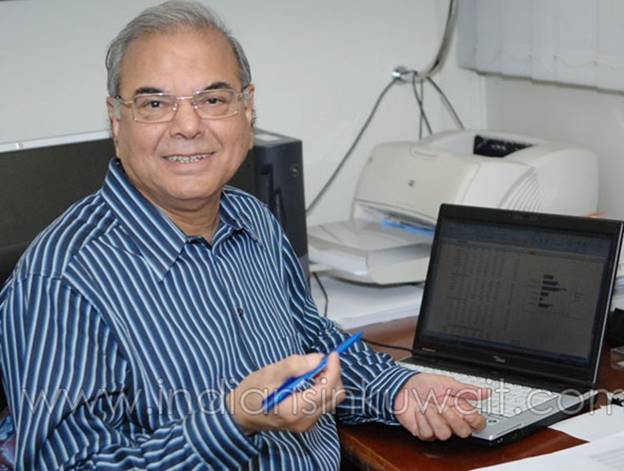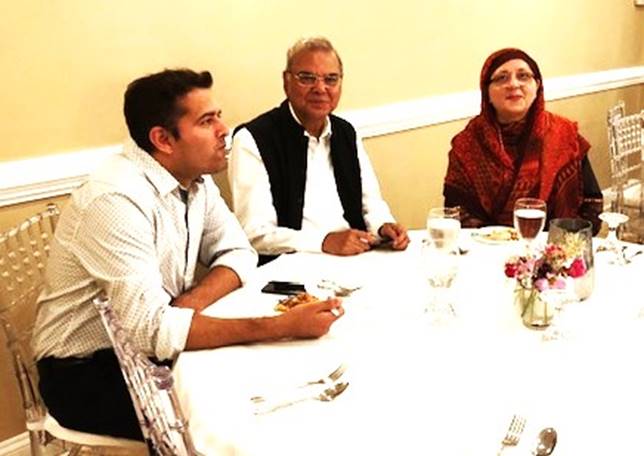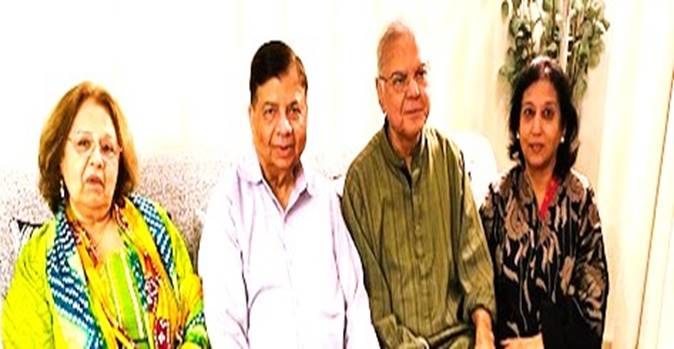
Dr Mirza Umair Beg

At their Dubai residence. From left: Mansoor Beg, Dr Mirza Umair Beg, and Naheed Beg

The author with Dr M. U. Beg and members of the family at a Washington Eid event
Dr Mirza Umair Beg: A Luminous Legacy of Science and Literature
By Dr Zafar Iqbal
Washington, DC

Dr M. U. Beg's sudden departure on April 15, 2024, in Lucknow has left a profound void in our hearts. More than a family member, he was the youngest sibling of my late mother, a presence deeply woven into the fabric of our lives. The news of his passing, conveyed by his son Mansoor, struck us like a sudden, staggering blow.
In moments like these, life's unpredictability becomes painfully apparent. Just the day prior, we had gathered joyously for Eid, sharing laughter and memories. Mansoor had shared with us the meticulous arrangements Dr Beg had made for a medical procedure for Mansoor’s mother at a Lucknow hospital. Little did we know that, within moments, we would be plunged into the depths of grief at his father's unexpected departure.
Dr M. U. Beg was a luminary in both science and literature. His love for Urdu literature continues to echo through his books and stories, which are accessible on his Facebook page, ‘Kahani Reading Club' and ‘Shajar.’
Dr Beg was more than an environmental scientist; he was a luminary whose passion for Urdu literature was as remarkable as his contributions to academia. Since the seventies, his classic books and numerous short stories have enchanted readers, leaving an indelible mark on the literary landscape. His dedication to scientific advancement extended beyond borders, shaping the fields of study not only in his native India but also in the UAE, Kuwait, and beyond.
Born on July 8, 1946, in Lucknow, India, Dr Beg's insatiable curiosity and intellect set him apart from a young age. His pursuit of knowledge spanned both scientific inquiry and literary exploration, paving the way for an extraordinary career that bridged two seemingly disparate worlds. He obtained his early education at Mumtaz Higher Secondary School, Lucknow (now Mumtaz Degree College) and intermediate from the Aminabad Inter College followed by BSc, MSc degrees from Lucknow University.
In the realm of scientific research, Dr Beg's pioneering work under Professor P. S. Krishnan, Head of the Biochemistry Department of Lucknow University earned him international acclaim and countless accolades. Armed with a PhD degree, he made significant contributions that transcended the confines of academia, impacting communities far and wide.
Dr Beg embarked on his illustrious career at the Industrial Toxicology Research Centre, now known as CSIR-Indian Institute of Toxicological Research, Lucknow. Through dedication and expertise, he ascended to the esteemed rank of Scientist EII (Senior Assistant Director). His journey then led him to an international stage when he was appointed by the CSIR, Government of India, to spearhead the establishment of the Dubai Institute of Environmental Research, serving as its pioneering Director. Earlier, the CSIR also deputed him to the World Health Organization (WHO) Fellow to the UK, Netherlands, Belgium, RFG, Poland, Switzerland, Finland, and USSR on various projects.
During his long career conducting research in biochemical and toxicological aspects of environmental pollution, he participated in national and international scientific conferences and contributed to reputed international scientific journals and books. In addition to this groundbreaking endeavor, Dr Beg played a pivotal role in laying the foundation of the Dubai Pharmacy College, where he served as the founding Director. Subsequently, he transitioned to the Kuwait Institute for Scientific Research, Kuwait, where he continued to make significant contributions to the field. Over the course of three decades, Dr Beg served as a Senior Research Scientist, dedicating his expertise to the study of environmental toxicology, with a particular focus on marine ecosystems.
Through his leadership, research, and unwavering commitment, Dr Beg has left an indelible mark on the scientific community, shaping our understanding of environmental health and toxicology on both national and international fronts.
Yet, Dr Beg's brilliance wasn't confined to laboratories; it shone just as brightly in the world of literature. As a prolific Urdu writer, he crafted works of fiction and poetry that plumbed the depths of human experience, touching hearts and minds around the globe.
Influenced by the literary prowess of his brother-in-law, the esteemed Dr Shujaat Ali Sandilvi, Dr Beg embarked on a captivating literary journey. His insightful articles found their way onto the esteemed pages of Urdu publications such as Qaumi Awaz, Shama, and Beesvi Sadi, adorning them with his intellect. Among his notable works are two published books, "Sangreze" and "Yug Yug ki Baat," the latter earning recognition from the prestigious Urdu Academy of Uttar Pradesh.
Moreover, his pleasant voice resonated across the airwaves through platforms like All-India Radio and Lucknow Door Darshan. This was a testament to his talent, further fueled by the supportive guidance of Mr Shafaat Ali, the esteemed overseer of Urdu programs at AIR Lucknow.
I vividly recall an interview with Dr Beg conducted at AIR Lucknow, during my visit to India from the USA under the United Nations Development Program's Transfer of Knowledge Through Expatriate Indian Nationals initiative in 1974.
Beyond his professional pursuits, Dr Beg was a champion of harmony and understanding, advocating tirelessly for peace and tolerance. His legacy of warmth, compassion, and generosity will continue to inspire generations to come.
Though Dr Beg was my maternal uncle, our bond transcended familial ties; we grew up as close friends, sharing not just blood but also experiences. With parallel academic paths, we navigated through our education together, our trajectories mirroring each other's. Despite geographical distances that emerged as I settled in the USA and he in the Middle East, our connection endured, sustained by constant communication. Our reunions became rare occasions, yet each meeting held the essence of cherished memories. Our last encounter took place in February 2023, amidst the gleaming backdrop of his new Dubai condominium, a moment suspended in time amid our ever-evolving lives.
Survived by his wife Naheed, son Mansoor, daughters Uzma and Hina, and grandchildren, as well as colleagues and friends, Dr M. U. Beg may have departed this world, but his legacy remains a beacon of hope and inspiration. Though he is no longer with us physically, his spirit will forever guide us.
Aane vaalii nasle.n tum par faKHr kare.ngii ham-asro
jab bhii un ko khayal aa.egaa tum ne 'Umair' ko dekhaa hai
With an apology to Hazrat Firaq Gorakhpuri. I have replaced ‘Firaq’ with ‘Umair’.

